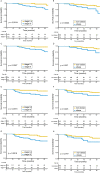Obesity is associated with early recurrence on breast cancer patients that achieved pathological complete response to neoadjuvant chemotherapy
- PMID: 36477462
- PMCID: PMC9729290
- DOI: 10.1038/s41598-022-25043-2
Obesity is associated with early recurrence on breast cancer patients that achieved pathological complete response to neoadjuvant chemotherapy
Abstract
Pathological complete response (pCR) after neoadjuvant chemotherapy (NCT) is associated with good long-term prognosis in breast cancer (BC) patients. However, some patients still recur and eventually die from this disease. For years, clinical stage at diagnosis has been consistently linked to recurrence and survival in the pCR setting. Herein, we aimed to identify other potential predictors of recurrence and survival in patients that achieved pCR. We performed a retrospective analysis of patients diagnosed between 2011 and 2020 in our center. We calculated overall survival (OS), invasive disease-free survival (IDFS), distant disease-free survival (DDFS), and BC-specific survival (BCSS). Among the 241 patients included into our study 36% were obese (Body Mass Index (BMI) > 29.9 kg/m2) and 47% were stage III. Multivariate analysis confirmed that obesity was a significant risk factor associated with early recurrence and poorer survival in these patients. In summary, obesity and clinical stage predict early recurrence and poorer survival in patients that achieved pCR after NCT. Pending further investigation and based on our findings we speculate that weight management could be beneficial for this subset of patients. To our knowledge, this is the first Latin American report linking obesity and recurrence within this setting.
© 2022. The Author(s).
Conflict of interest statement
The authors declare no competing interests.
Figures


Similar articles
-
Obesity is an independent prognostic factor of decreased pathological complete response to neoadjuvant chemotherapy in breast cancer patients.Breast. 2017 Apr;32:237-244. doi: 10.1016/j.breast.2016.05.013. Epub 2016 Jun 16. Breast. 2017. PMID: 27318645
-
A Multicenter Study of the Impact of Body Mass Index (BMI) on the incidence of Pathologic Complete Response (pCR) Among Saudi Patients with locally advanced Breast cancer (LABC) post Neoadjuvant Chemotherapy (NAC).Gulf J Oncolog. 2019 May;1(30):33-42. Gulf J Oncolog. 2019. PMID: 31242980
-
Impact of body mass index on pathological complete response and survival of breast cancer patients receiving neoadjuvant chemotherapy.Breast Dis. 2022;41(1):351-361. doi: 10.3233/BD-210071. Breast Dis. 2022. PMID: 36031886
-
Overview of resistance to systemic therapy in patients with breast cancer.Adv Exp Med Biol. 2007;608:1-22. doi: 10.1007/978-0-387-74039-3_1. Adv Exp Med Biol. 2007. PMID: 17993229 Review.
-
Ki-67 labeling index is a predictive marker for a pathological complete response to neoadjuvant chemotherapy in breast cancer: A meta-analysis.Medicine (Baltimore). 2017 Dec;96(51):e9384. doi: 10.1097/MD.0000000000009384. Medicine (Baltimore). 2017. PMID: 29390540 Free PMC article. Review.
Cited by
-
The intricate relationship between obesity, type 2 diabetes and female breast cancer: A retrospective study of 335 women.Obes Sci Pract. 2024 Aug 9;10(4):e786. doi: 10.1002/osp4.786. eCollection 2024 Aug. Obes Sci Pract. 2024. PMID: 39130194 Free PMC article.
-
Adjuvant melatonin therapy during exercise prescription in breast cancer survivors on physical and anthropometric parameters, quality of life, and hormonal response. A randomized controlled trial.Front Sports Act Living. 2025 Jun 23;7:1594733. doi: 10.3389/fspor.2025.1594733. eCollection 2025. Front Sports Act Living. 2025. PMID: 40625889 Free PMC article.
-
The Relationship of Pathological Response and Visceral Muscle and Fat Volume in Women With Breast Cancer Who Received Neoadjuvant Chemotherapy.Eur J Breast Health. 2024 Apr 1;20(2):117-121. doi: 10.4274/ejbh.galenos.2024.2023-12-5. eCollection 2024 Apr. Eur J Breast Health. 2024. PMID: 38571683 Free PMC article.
-
Combined Aerobic and Resistance Training Improves Body Composition, Alters Cardiometabolic Risk, and Ameliorates Cancer-Related Indicators in Breast Cancer Patients and Survivors with Overweight/Obesity: A Systematic Review and Meta-Analysis of Randomized Controlled Trials.J Sports Sci Med. 2024 Jun 1;23(2):366-395. doi: 10.52082/jssm.2024.366. eCollection 2024 Jun. J Sports Sci Med. 2024. PMID: 38841642 Free PMC article.
-
Resistance to neoadjuvant chemotherapy in breast cancers: a metabolic perspective.J Exp Clin Cancer Res. 2025 Aug 11;44(1):234. doi: 10.1186/s13046-025-03500-w. J Exp Clin Cancer Res. 2025. PMID: 40790759 Free PMC article. Review.
References
MeSH terms
LinkOut - more resources
Full Text Sources
Medical

